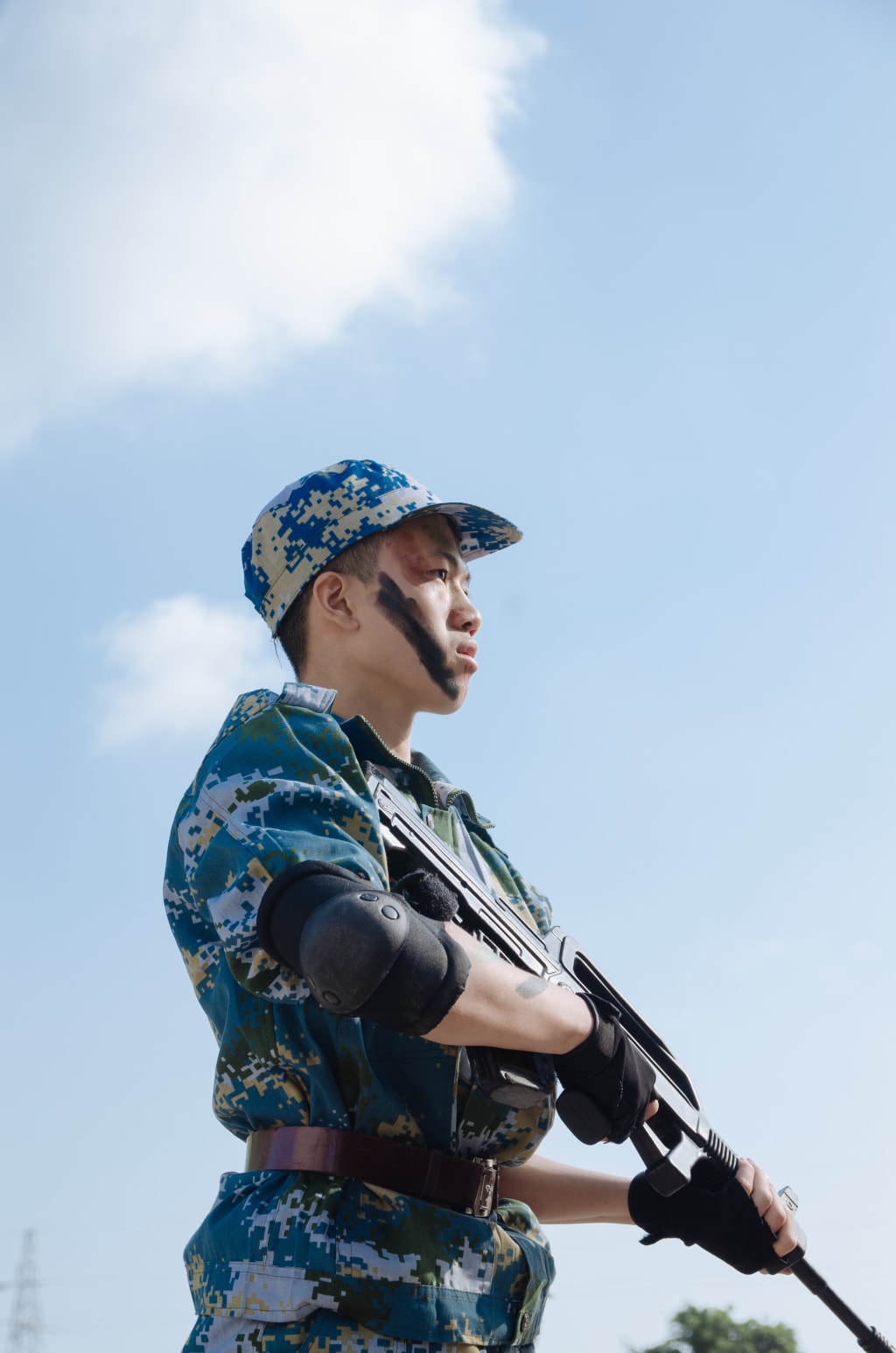The Coming Era of Might Makes Right
The Future Is Militarized

Lately, I've been coming to a depressing conclusion about the emerging character of our century. And it all started with travel television.
I'm a fan of those shows where witty people with excellent camerapeople travel the world and go places I'll likely never go. Two of my favourites are the Canadian show Departures and TheLong Way Round/Down/Up series.
These shows are, admittedly, getting a little long in the tooth. And that's instructive. They show what's happened to the world in the last decade. You're insane if you travel to Libya now, for instance. What was once difficult for Justin and Scott of Departures or Ewan and Charley of Long Way Down is now practically impossible unless you bring firepower.
Likewise, crossing the Ukrainian/Russian frontier, as both duos did, has become an exercise fraught with peril. Another favourite of mine, the early millennium Globe Trekker, featured visits to Syria and Lebanon, among others. How many would follow in those footsteps in 2018?
The world is constricting. It is now less open, more rigid, and less responsive to the old notions of international law and freedom of movement.
When the law is absent, what takes its place?
Force. That's what. There's a lot of that on display lately.
Russia annexes the Crimea and shuts the Sea of Azov to Ukrainian navigation. China builds new islands in the Spratly Group in a naked attempt to claim sovereignty over a resource-rich region. Iran threatens to close the Straits of Hormuz to navigation, which would cripple our still oil-based economy. Saudi Arabia slaughters a dissident journalist on Turkish soil, then makes a clumsy and cynical attempt at scapegoating to cover it up.
I think this sort of naked aggression was a little rarer ten years ago. Countries who wanted to act badly were still worried about UN Resolutions or unilateral NATO action. Clearly, they aren't any more.
This sort of thing has happened before, and the precedent is worrying. In 1935, the League of Nations, the high-minded, but utterly toothless child of US President Woodrow Wilson (whose Congress then embarrassed him fatally by vetoing US membership), was faced with a critical test.
Italy had invaded Ethiopia in a transparently greedy act of land-grabbing against Africa's only uncolonized state. The Ethiopians fought bravely, but it was literally sticks against bombs. They appealed to the international community for help.
What happened? Nothing. The western powers were too scared of war to do more than posture and virtue signal against Mussolini. The message was broadcast to the world: We're only here to talk. There's nothing backing it up.
That message was duly noted by many, but one man in particular viewed it as a green light. That man was Adolf Hitler.
Now, the inter-war period is often brought up to frighten people into this or that agenda. Often wrongly. But I'm convinced, increasingly, that the forces afoot in the world today are more dangerous than at any time since 1935. The UN's credibility as a stabilizing force and proto-world-cop is severely lacking. Why?
The UN has, in fact, rarely acted as a unified body to respond to aggression. This is due to the central fact of its existence: The Security Council. The five permanent members, the US, Russia, France, China, and the UK, sit as a reflection of their nations' role in the victory of WWII (As a Canadian, I feel a bit ripped off by that, but that's another blog). They and they alone hold veto power over binding resolutions. The non-permanent members are simply window dressing. The result is a largely toothless chamber of chattery.
There have been a couple of exceptions to this rule. The UN acted decisively to halt Communist aggression in Korea in 1950, but this miracle was only achieved because the CIA made sure the Soviet delegation missed the vote due to "New York traffic." In 1960, during the Katanga rebellion in the Congo, unified UN action was possible due to a rare convergence of opinion: Both the US and the USSR found Belgian colonial predation distasteful. Otherwise, the fear that any conflict could become a nuclear conflict was the force really maintaining global peace, such as it was. The UN was a debating chamber, nothing more.
Between 1991 and 2003, the Security Council could function because of post-Cold War US/Russian relations and a China not yet ready to directly challenge the US allowed it. But the US fatally damaged its reputation in 2003 with the spurious case for war against Iraq. This coincided with the erosion of US/Russian relations, to the point where the Security Council has reverted to Cold War form: dueling blocs of vetoes, where the only thing that really matters is perfect attendance.
The other entity supposed to guarantee our security is NATO. In the Cold War, this alliance maintained it's credibility through the certain knowledge, in the Soviet mind, of two things: One, the alliance, although perpetually outnumbered, was a credible military force capable of responding devastatingly to aggression; two, the alliance's "red line" was a credible one: Nobody doubted that a crossing of the Inter-German frontier was a casus belli. It was an important combination that helped deter war.
Today, the alliance suffers from a lack of both factors. Spending on defence has lagged below 2% of GNP target for most countries, some of the most egregious offenders being the nations long regarded as NATO's bedrock, namely Germany and France. Canada? Forget it. We can't even make 1%, and fielding a combat-ready battalion stretches our capabilities, let alone a brigade. This leaves the US subsidizing Europe's defence, something rather hard for US voters to accept, given that a German worker gets six weeks' paid vacation a year while an American gets two. The people who don't like this situation voted for Donald Trump, and he hasn't been shy about addressing it. While there's lots of talk about a "European Army," at this point, it's simply a fantasy. That would mean Europeans would have to start paying their own defence bills, and that's not happening anytime soon.
The credibility issue has also crept back, with a vengeance. NATO underwent an optimistic, post-Cold War expansion, coming in some cases to the borders of Russia. While few would argue that the sovereignty of the Baltic States is a worthy cause to embrace, the question of whether or not we would fight Russia on this one is, in my mind, seriously open to question. Committing token forces to "reassure" Estonia or Romania may make for great PR, but it hardly equals the forceful message sent by the old "Reforger" exercises of the Cold War. Does anyone seriously think that a few hundred NATO troops would slow down a Russian assault for more than a half-hour? And after that, what? I believe current Russian behaviour points to one, inescapable fact: Putin doesn't think that anyone in Brussels thinks it will come to that. And if it does, they don't really have a plan.
That's very, very dangerous. Russia has undermined the basis of western security, and we were only too happy to help them do it. After all, Germany is dependent on Russian natural gas for a large part of its energy needs. The Germans blithely seem to think that they can handle Russia, and if they object to a particular action, the Russians always have the powerful weapon of war guilt to cow them. The rest of the EU is too distracted by Brexit to notice the looming threat to the east. And America is preoccupied with disunion at home and the potential of much of Latin America walking across its southern border.
Europe is in serious trouble. The situation on the Pacific scene is little better. China has finally decided it is time to begin flexing its muscle. The Spratlys are the most obvious example, but the aggressive use of donor money and rampant espionage are two others.
China is little understood in the West, which is seemingly an eternal phenomenon. I don't pretend to understand her either, but from my perspective, she has one salient characteristic we'd all be wise to reflect on:
China is aggrieved. She feels she is great, possibly even the greatest of nations, and she has been long disrespected. And now she feels the time is right to do something about it.
What do you know, or care, about the Opium Wars? How about the Western Cantonments of the late nineteenth and early twentieth centuries? The Sino-Japanese Wars? All humiliations of then-backwards, feudal China, at the hands of the West, or the West's longtime ally, Japan.
You may not care, but Chinese schoolchildren learn all about it. They care.
Now, as African-Americans used to say to their former owners after the end of the Civil War, "Bottom rail on top."
So far, this thirst for respect has taken mostly benign forms. Building bigger buildings, faster trains, their own space stations. Good for them. But remember, this is an authoritarian regime with little respect for human rights and no free press. The brakes on potential bad behaviour are simply not there. And since we've exported much of our industrial base and a whole lot of our secrets, our power to contain China militarily is severely lacking.
And gee, guess who they're conducting joint war games with? That's right, Russia.
The US Department of Defence recently released a study in which they warned that the US might face a war on two fronts against Russia and China. And it might lose.
We are entering a world where fine words and ethical stances will have little or no meaning unless supported by force. Sorry, but that's the way it is. It's not a world for the likes of Justin Trudeau or Angela Merkel.
We could have moved beyond this, I suppose, but we screwed it up, and the next generation will suffer from our mistakes. The only way to ensure continued world peace is credible collective security. There is no substitute.
Build more tanks and fighter planes. People need work, anyway. Think about the draft, because young people could probably use the discipline. Keep talking, and be aware of the sensitivities of our adversaries. Don't provoke them unnecessarily, but be certain of where the red lines are, and make sure they are too.
We've tried it before, and it worked. It was called the Cold War. Maybe a balance of terror is the only real guarantee of peace. It's a depressing thought. I hope I'm wrong.
Maybe, when you can backpack through Syria again, I'll admit it.
About the Creator
Grant Patterson
Grant is a retired law enforcement officer and native of Vancouver, BC. He has also lived in Brazil. He has written fifteen books.






Comments
There are no comments for this story
Be the first to respond and start the conversation.